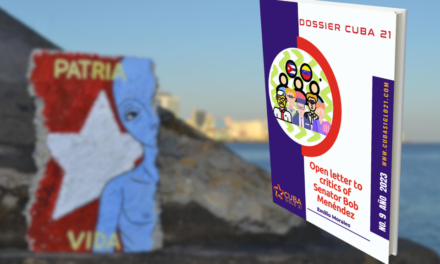Descargar Dossier completo en español (pdf)
Download Dossier -full report- in English (pdf)
Today, the main challenge to change towards an open, democratic, and prosperous society based on the rule of law and a free market, is the need to reach a consensus among different social sectors and actors on a shared road map to transform the highly probable upcoming rebellions into a broad social movement aimed at displacing the power of the oligarchy.
It is a certainty that 2024 begins with the most fragile level of governance in the last 64 years. Never were the powers that be as weak as today. The governance regime (set of institutions and regulations according to which national resources are administered, reproduced, and expanded) has collapsed and is not reformable. This situation is unsustainable in the short and medium term, but the central core of the power elite, with Raúl Castro at its head, resists admitting this reality.
The GAESA oligarchy and the core of historic leaders face a tsunami of social demands from multiple and dissimilar sectors whose situation is deteriorating by the day. This bloc of those affected by the status quo includes broad layers of peasants, state workers, pensioners, veterans, cultural sectors, administrative officials, and military officers of various ranks, as well as self-employed workers. There is even an incipient tendency among those who have invested in MSMEs without having a close relationship with GAESA or the state to join the nonconformists, although the authorization to open a MSME reflects that they were not vetoed when they passed the previous screening process to find out if they had ever been critical of the system and its leaders.
It is highly improbable to expect passive submission from those who had not migrated. Some nine or ten million remain on the island after the last exodus. It is highly risky to bet that they will submit without rebelling to the continuous and increasingly rapid degradation of their daily lives in terms of food, medicine, health, drinking water, electricity, transportation, and other services that the collapsed regime of governance is no longer able to provide.
It is highly probable that in 2024 there will be social explosions of significant magnitude with the potential to expand their impact and spread to different regions and sectors of the country. The combination of repression and mass exodus that the national oligarchy has bet on to navigate this crisis is not enough to contain the growing instability. The malaise has transformed into a generalized and stable consensus about the impossibility of prospering within the current status quo and about the incapacity of the leaders to reverse and transform this situation.
It is a certainty that in 2024 Cuba presents a turning point, a historical bifurcation in the face of two possible transitions. A democratizing one, promoted by multiple forces with diverse origins and plural ideologies, but all interested in achieving welfare with freedom. Another—which could gain strength among the oligarchic sectors, especially after Raúl Castro’s death—favors a transition from the current totalitarian mafia state to another, modern model of autocratic mafia state with a limited market economy. A variant of this trend is the one that favors the establishment of a Chinese-style Market Stalinism. Both anti-democratic currents express the maximum limit of “reformism” within the power elite that could manifest itself more clearly after Raúl Castro’s death.
It is also a certainty that new social explosions are highly probable in 2024. This is not equivalent to saying that there is certainty on the possible success by democratizing forces in capturing power this year. The latter will not happen unless there are processes of concertation between the different social forces interested in change.
The future projection of Cuban society is uncertain. Neither the oppressors have a guaranteed future in Cuba today, nor does democracy have such a guarantee. Whether it will be a democracy with a market or an autocratic mafia state with a limited market economy will depend on the current struggle between the social forces—oligarchic and popular—until one of the two manages to impose itself in the political arena. The third option —adopting the Chinese system of Market Stalinism—had sympathizers years ago among party militants, the military, and organic intellectuals, but it is not certain that it is still today an alternative for those sectors that have lately inclined for the democratic path or the option of modernizing the mafia state.
However, a major obstacle to defeat this totalitarian regime is pessimism. This pessimism is encouraged by the regime through its propaganda apparatus, infiltrators, and agents of influence on the island and in the diaspora. It is for this reason that it is of utmost importance to enhance the capacity of the citizenry to visualize the immediate positive future that would materialize if the oligarchy is removed from power.
People fight not only when they know they are victims of injustice, but also when they believe that a better future is possible in their lifetime and is worth taking risks to achieve it.
The alliance with Russia has added uncertainty to national security rather than certainty of economic improvement. Unconditional support to Putin and now to Hamas and Iran, does not seem to bring material benefits in terms of new credits and investments, even though multiple letters of intent have been signed for propaganda purposes. What this adventurism has objectively achieved so far is to expose the country to a possible worsening of external sanctions.
Cuba is not simply a dictatorship that violates human rights. It is a threat to the national security of the United States, to the interests of the West and to the stability democratic societies with the rule of law in Latin America. Cuba is an essential ally of the new Axis of Evil for the Latin American region.
What is at stake in this race against time is not only the defeat of totalitarianism, but the strategic connection of Cuban society with the global transformation process of the information age at the gates of a fifth industrial revolution with the massive use of artificial intelligence.
The transnational integration of the diaspora and Cubans on the island in a project of co-dependent development —once democracy, the rule of law and a market economy are established—has all the necessary conditions to turn the current disaster around quickly and dramatically.
Descargar Dossier completo en español (pdf)
Download Dossier -full report- in English (pdf)







